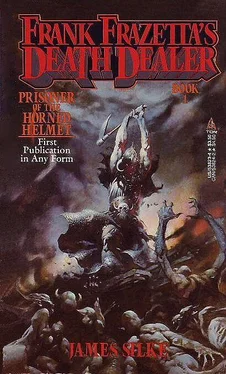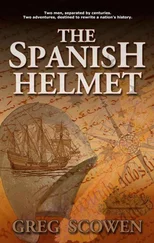James Silke - Prisoner of the Horned helmet
Здесь есть возможность читать онлайн «James Silke - Prisoner of the Horned helmet» весь текст электронной книги совершенно бесплатно (целиком полную версию без сокращений). В некоторых случаях можно слушать аудио, скачать через торрент в формате fb2 и присутствует краткое содержание. Жанр: Фэнтези, на английском языке. Описание произведения, (предисловие) а так же отзывы посетителей доступны на портале библиотеки ЛибКат.
- Название:Prisoner of the Horned helmet
- Автор:
- Жанр:
- Год:неизвестен
- ISBN:нет данных
- Рейтинг книги:4 / 5. Голосов: 1
-
Избранное:Добавить в избранное
- Отзывы:
-
Ваша оценка:
- 80
- 1
- 2
- 3
- 4
- 5
Prisoner of the Horned helmet: краткое содержание, описание и аннотация
Предлагаем к чтению аннотацию, описание, краткое содержание или предисловие (зависит от того, что написал сам автор книги «Prisoner of the Horned helmet»). Если вы не нашли необходимую информацию о книге — напишите в комментариях, мы постараемся отыскать её.
Prisoner of the Horned helmet — читать онлайн бесплатно полную книгу (весь текст) целиком
Ниже представлен текст книги, разбитый по страницам. Система сохранения места последней прочитанной страницы, позволяет с удобством читать онлайн бесплатно книгу «Prisoner of the Horned helmet», без необходимости каждый раз заново искать на чём Вы остановились. Поставьте закладку, и сможете в любой момент перейти на страницу, на которой закончили чтение.
Интервал:
Закладка:
Seventy-one
Reaching home, Robin and the Cytherian warriors were greeted warmly and with great honor and celebration. Robin was given a place of honor at the feast, anointed with incense and garlands of flowers, and, even though she was wan, pale and stood out vulgarly in her short hair, was praised as a daring and courageous girl of virtue and beauty. During the following weeks, the children came flocking to hear her tell of her adventures. Their adoration, along with a steady diet of milk, hardy bread and fresh fruit, quickly nourished her back to health and lifted her spirits so that once more she began to echo the melodies of the birds and the laughter in the ripple of the brook.
But when the wounded veterans of the campaign dragged their crippled limbs back into the taverns to tell their version of the war, things began to change. The soldiers relieved their aches and pains with quantities of hard wine and wildly exaggerated tales of their battles, laying dark emphasis on all that was unnatural, mysterious and brutal: the satanic appearance of the Queen of Serpents, the devil fire within the horned helmet, the horrible transformation of the warlord into a hideous reptile, and the long, unexplained and intimate visits Robin Lakehair had paid the Dark One in his secret home in The Shades, a place where strong men feared to travel, yet a place from which she always returned unhurt and in remarkable health.
As these tales, along with those of the unholy carnage done by the Death Dealer and his axe, circulated, they grew uglier and more sinister according to the appetites of both the tellers and listeners. Consequently, many of the villagers who had suffered loss of loved ones during the conflict, were uncomfortably reminded of their unhappiness, and disturbed by unnatural fears. The stories, after becoming old and revolting, stopped. But Robin was an ever-present reminder of times best forgotten. And, as she herself had suffered no ill effects from her very questionable adventures, rumors began that she was in some way tainted by them.
If she was, of course, she could contaminate the holy work and spoil the cloth, so her spindle was taken away and given to another girl. Robin tried to bear up under the hurtful insult, believing that time would eventually restore her tribe’s belief in her.
But it was the gossip that was fed by time, and Robin, who could not comprehend these attacks against her, did not know how to argue against them. The situation compounded. She was shunned at the well, and the children were led from her presence. She spent much time in the forest, but too much time alone brought on a deep melancholy, and it became more and more difficult for her to return to her room in the evening.
Then one night she dreamed of the children themselves reviling her. She woke up drenched in sweat and sobbing. Panic made her heart pound and showed in her eyes. She jumped out of bed, threw on her bone-white tunic and slipped into her soft leather boots. With her belongings packed in a bedroll, and tied to her back, she dashed out of Weaver before first light. Her sacred whorl was held tight in her fist. But there were shadows under her eyes, and no lilt in her stride. There was no longer a friend to whom she dared say good-bye.
When she arrived at Pinwheel Crossing, the morning sun was beating down on her hair and shoulders. She studied the many signs marking the roads: Amber Road which would take her she did not know where, the road to Coin and the Kavens, then the road to Dowat territory. But they only made tears well in her eyes. She glanced back down Weaver Road, and looked at the sacred whorl in her fist. Defiantly she flung the whorl into the surrounding foliage and started down the Way of the Outlaw.
She had no other choice. She was an outcast.
Seventy-two
Robin reached Stone Crossing when the sun was low in the western sky. She climbed to its heights and paused there, gazing down at the camp spread out among the apple trees in the clearing beyond the river. A tentative smile lifted the corners of her small pert mouth, but before she was halfway down the slope, the smile was moving with abandon into her cheeks.
There were children playing on the ground under the trees. Seeing her approach, they stopped their game, and crowded around her, bombarding her with questions.
“Who are you?”
“What’s your name?”
“Did you come to see the show?”
“Are you going to stay?”
Robin listened with delight, then covered her ears playfully and they laughed, quieted. She considered them for a moment with warning eyes, then asked, “Are you going to let me say something, or aren’t strangers allowed to talk in Rag Camp?”
They smiled shyly, and nodded.
“All right,” she said, then squatted facing their small active faces. “Now, I am looking for a man called Brown John, is he here?”
“Oh yes,” they squealed.
They took her hands and led her across the clearing toward the stage where the three colorful wagons served as backdrops.
“He’s over here.”
“In the red wagon.”
“That’s his house.”
“Really?” Robin gasped admiringly, “I thought it was just part of the stage.”
“Oh no! It’s his wagon.”
“The best in the whole camp.”
“He’s real important.”
“And bossy.”
“But don’t be frightened.”
“He’ll like you.”
“Because you’re pretty,” put in the littlest one.
Robin laughed, picked her up with a squeeze. They all hurried to the raised stage, and the children pushed Robin up onto it. They began to shout at the upstairs window; Brown John stuck his frowsy head out and shouted right back, “What is it now? I told you not to bother me during my nap. Do I have to…”
He stopped abruptly seeing Robin’s face smiling up at him, then said quietly, “My, my.” He turned on the children shouting, “Let her in, you noisy imps. She’s late, very, very late!”
After the evening meal, Brown John held court on the stage to determine Robin’s status with the Grillards. He sat on a large thronelike chair facing Robin. Gathered around them, sitting on stools and the floor, were the tribe’s principal players: Mother Drab, Krell the Rubber Man, Bone, Dirken, Nose the Fool, and Belle and Zail, the lead dancing girls.
From his prominent position, he listened patiently to the speeches, all of which were rich with opinion and style, and lengthy. Then he presented briefly his conclusion. Robin Lakehair would be accepted into the camp and given a bed, a blanket and an equal share of wine and food. Then the arguments began as to which craft she would pursue. But, as these entertainers and thieves had no experience with such an abundance of virtue and beauty, they had no idea what trade Robin was suited for, and their disagreements became loud and hot. By tradition Brown John was only to speak when the group was out of words. But knowing that rarely happened, he interrupted firmly, “That’s enough. The discussion is ended. Robin will train as a dancing girl.”
Mother Drab, Belle and Zail laughed riotously, then Mother Drab arched a wicked eye at Brown John and said with a wry chuckle, “Her! A dancing girl! Why she’s got nothing up front and less behind, and even if she did she wouldn’t know how to toss it, or who to toss it at!”
Brown John waited until they all ran out of laughter, then fixed an eye fiercely on the troop.
“She will dance,” he said conclusively, “because she has other attractions which are suitable to the dance. And the stick and hoop will not be her teachers, but the white water splashing over the rocks of the stream, and the swallow in flight, the tree in the wind, the shooting star dashing across the night sky.” He raised an acknowledging hand to Mother Drab, Zail and Belie. “Do not misunderstand. I do not underestimate the extravagant wealth of your bouncing breasts and thundering hips. These are profound and sacred contributions to the dance, and I respect them as profoundly necessary and highly inspiring. But… I have a different vision for Robin. She will not dance as you dance. She will not perform ‘The Pregnant Virgin’ or even ‘The Wicked Wife’.”
Читать дальшеИнтервал:
Закладка:
Похожие книги на «Prisoner of the Horned helmet»
Представляем Вашему вниманию похожие книги на «Prisoner of the Horned helmet» списком для выбора. Мы отобрали схожую по названию и смыслу литературу в надежде предоставить читателям больше вариантов отыскать новые, интересные, ещё непрочитанные произведения.
Обсуждение, отзывы о книге «Prisoner of the Horned helmet» и просто собственные мнения читателей. Оставьте ваши комментарии, напишите, что Вы думаете о произведении, его смысле или главных героях. Укажите что конкретно понравилось, а что нет, и почему Вы так считаете.












